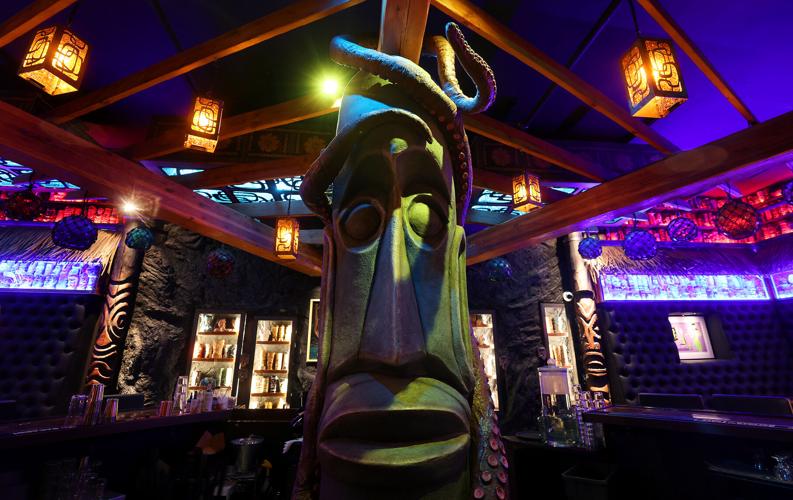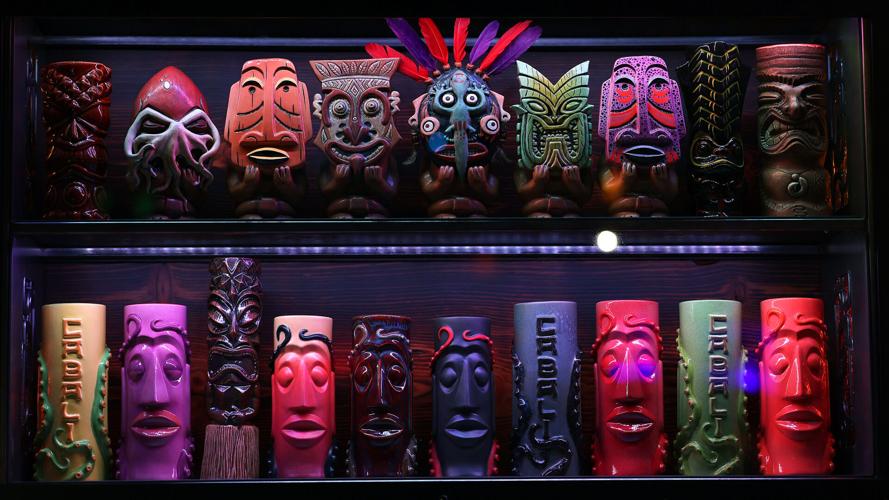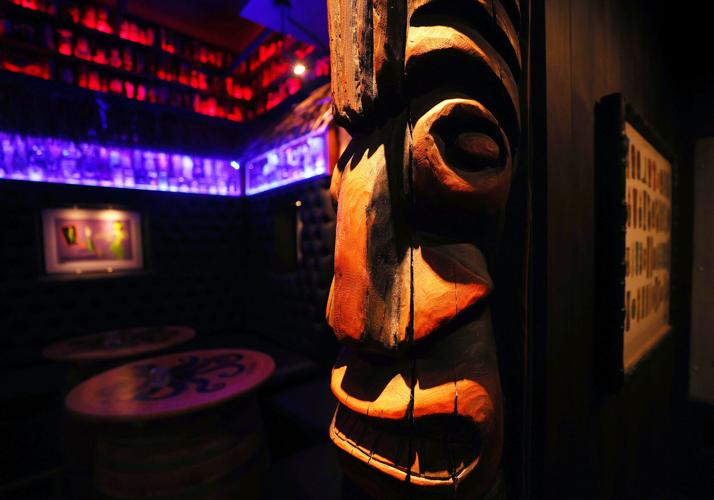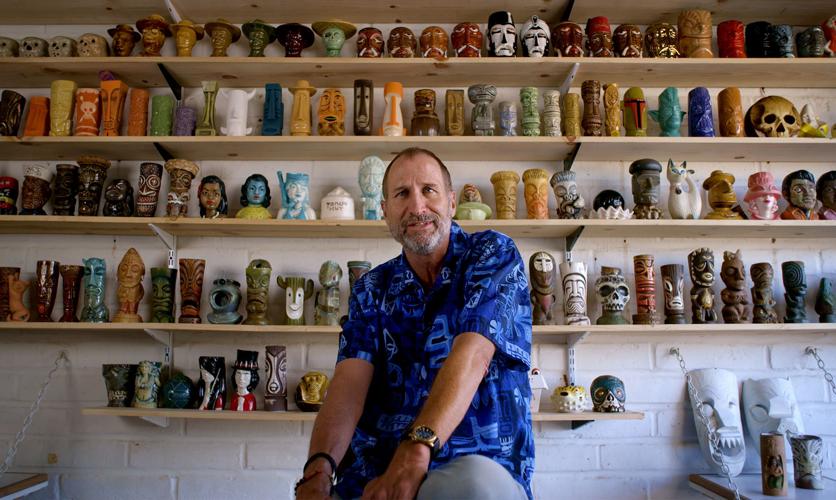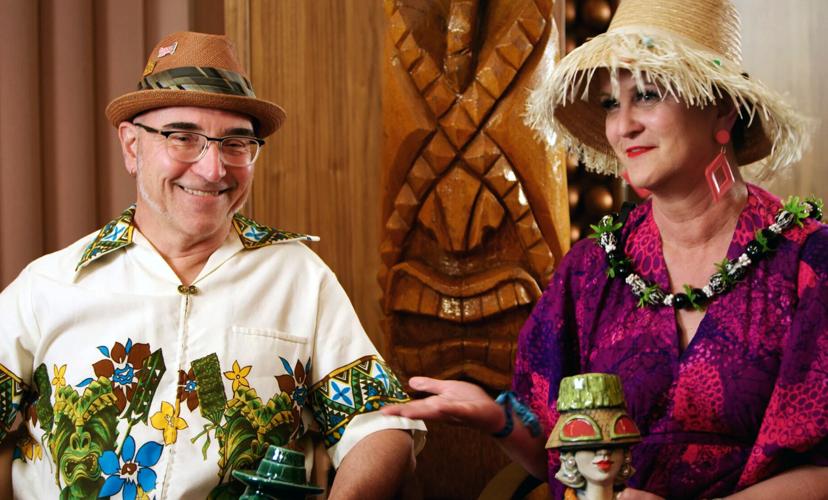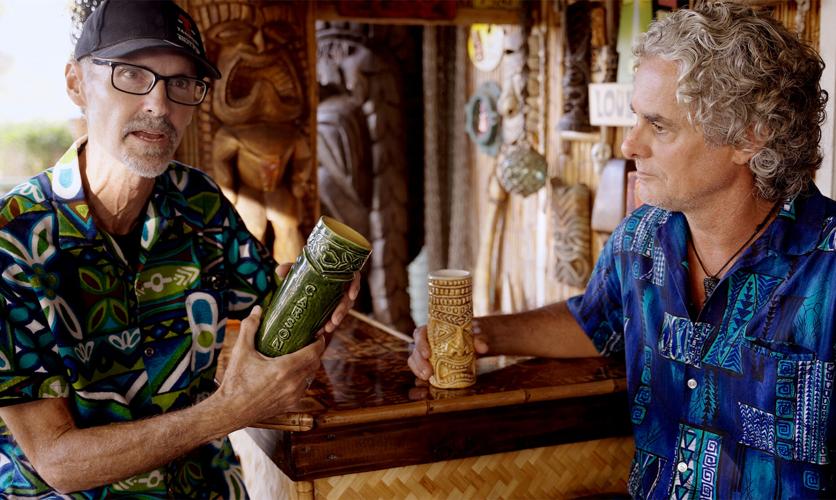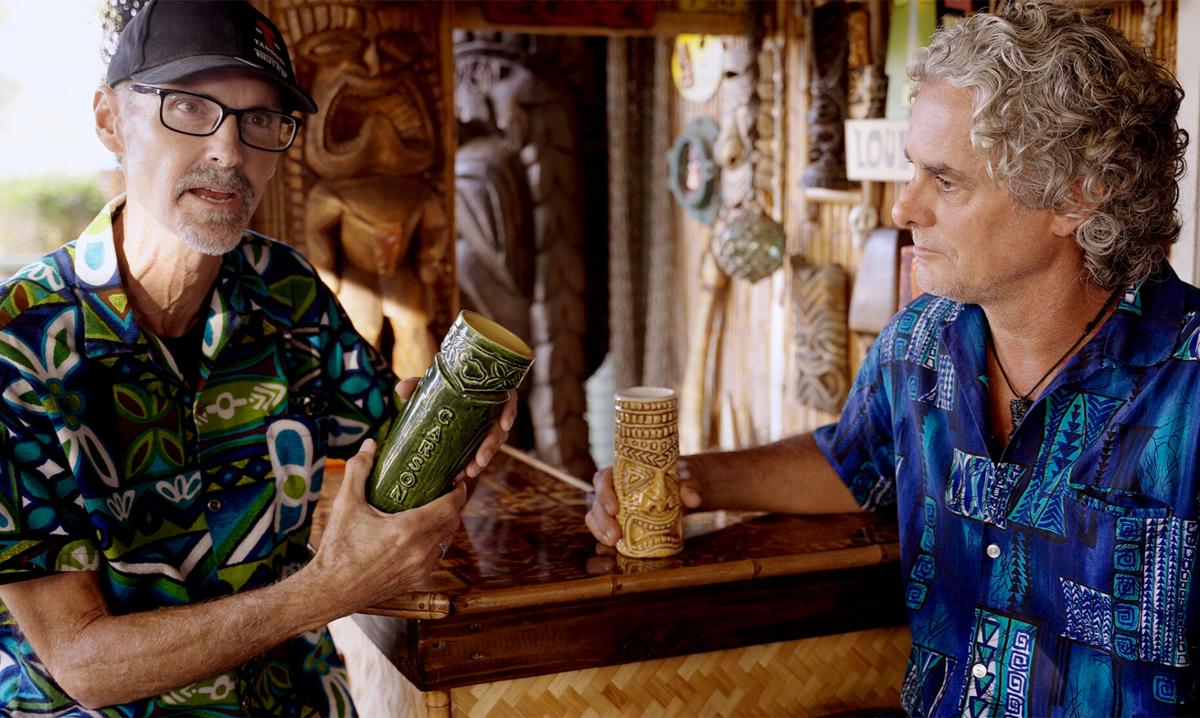Some people create display cases for their treasured collectibles.
Tucson restaurateur Doug ‚ÄúFini‚ÄĚ Finical created a tiki bar.
a speakeasy tucked into his and business partner Scott Mencke’s Oro Valley restaurant , is an homage to Finical’s 30-year obsession with tiki mugs.
He has 1,250 by his nearest guess, going back to his first ‚ÄĒ ‚ÄúMr. Bali Hai‚ÄĚ that he got in the early 1990s from Shelter Island in San Diego.

A statue by Tom Prevatt stands behind the bar at Cabali, 8195 N. Oracle Road in Oro Valley. The bar and its creator Doug ‚ÄúFini‚ÄĚ Finical are the subject of filmmaker Josh Dragotta‚Äôs documentary ‚ÄúCabali and the Tiki Mug Obsession,‚ÄĚ which will premiere Oct. 19 at the prestigious Newport Film Festival.
Around 1,000 of those tikis are on display in what Finical calls his ‚Äúbig art project.‚ÄĚ
A $500,000, three-plus-year art project.
It was supposed to cost $125,000 and take less than a year.
‚ÄúBeing a creative guy, I spend most of the time in my right brain, which is not the part of your brain that handles numbers, you know, including budgets or timelines,‚ÄĚ Finical said. ‚ÄúAnd I surrounded myself with craftspeople that were of the same. And the minute we started, you know, we hit on something.‚ÄĚ
It took Finical nearly three years working with a cadre of passionate craftsmen and tiki experts before he opened Cabali in February 2024.

At Cabali in Oro Valley, Doug ‚ÄúFini‚ÄĚ Finical included a shrine to the late tiki creator Rob ‚ÄúTiki Rob‚ÄĚ Hawes showcasing some of his iconic mugs. ‚ÄúTiki Rob Shrine‚ÄĚ also has a mug Hawes created for Cabali. A documentary about the tiki bar and Finical‚Äôs tiki collection will premiere at the Newport Film Festival on Oct. 19.
The opening was the finale of Tucson filmmaker Josh Dragotta‚Äôs 97-minute feature documentary, ‚ÄúCabali and the Tiki Mug Obsession,‚ÄĚ which will get its world premiere at the on Sunday, Oct. 19.
Sunday’s sold-out screening is the first of its three at the festival, which ranks as one of the country’s most coveted and largest film events, drawing thousands of entries and 60,000 attendees.
Only 350 of those submissions make the cut, and only a few get three screenings. It‚Äôs even more rare to sell out; ‚ÄúCabali‚ÄĚ sold out two of its three.
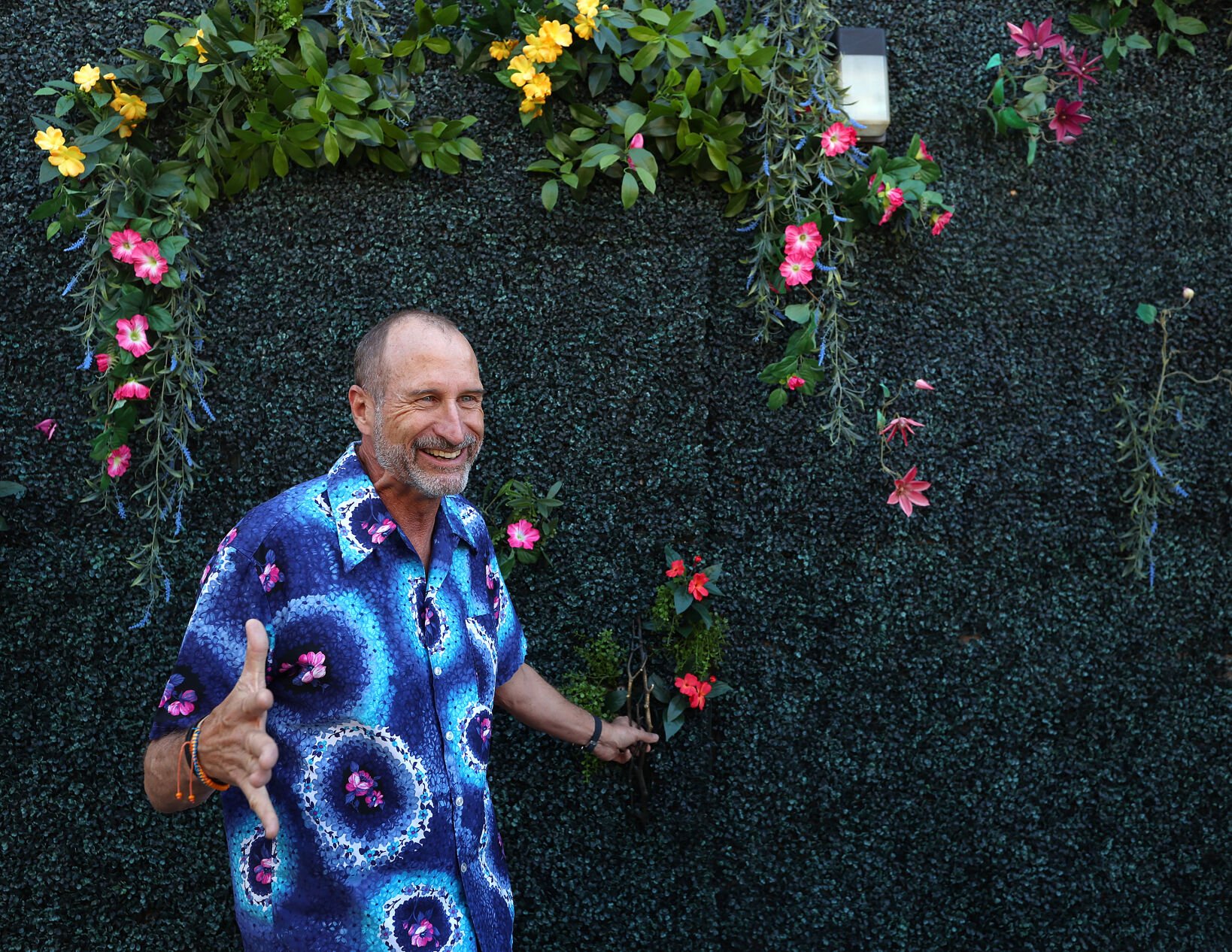
Doug ‚ÄúFini‚ÄĚ Finical, owner of Cabali speakeasy, stands by the entrance at 8195 N. Oracle Road in Oro Valley.
‚ÄėI think I have something really cool here‚Äô
‚ÄúCabali and the Tiki Mug Obsession‚ÄĚ was the second collaboration between Finical and Dragotta, whose paths crossed in the early 2000s on North Fourth Avenue. Dragotta curated the Back Alley Film Festival from Bison Witches restaurant while Finical and Mencke were running The Hut just a few doors down.
Back in 2008, a couple of years after New Jersey native Dragotta had left Tucson for Hollywood, Finical called. He wanted Dragotta to document the extraordinary transfer of the three-story, 25-ton Easter Island tiki from the shuttered Magic Carpet Golf to The Hut.
Dragotta says he didn‚Äôt realize it then, but that seven-minute ‚ÄúSave the Tiki‚ÄĚ film was a precursor to ‚ÄúCabali.‚ÄĚ
‚ÄúIn that little short film, we touched on tiki as this subculture and this art form, but also this crazy conquest that Fini had going through this endeavor of moving this giant tiki guy across Tucson,‚ÄĚ Dragotta said.
The pair kept in touch over the years as Dragotta carved out a film career in Hollywood before he and his wife decided to move home to Tucson during the pandemic.

Matt Cotten, a Tucson artist, learned how to carve wood in order to make the poles inside Cabali tiki bar in Oro Valley.
Within six months, Finical was reaching out.
‚ÄúHe said, ‚ÄėI got another idea I want to talk to you about‚Äô,‚ÄĚ Dragotta recalled. ‚ÄúHe started to tell me this story about this bar that he was building called Cabali and it‚Äôs this bar and it‚Äôs about tiki mugs. ‚ÄėAnd I got all these Tiki mugs‚Äô and I said, ‚ÄėWell, what do you mean you got a lot of tiki mugs?‚Äô And he says, ‚ÄėWell, my house is like full of tiki mugs‚Äô.‚ÄĚ
Dragotta decided he needed to see this for himself, so he met Finical at his home.
He wasn’t exaggerating, Dragotta said.
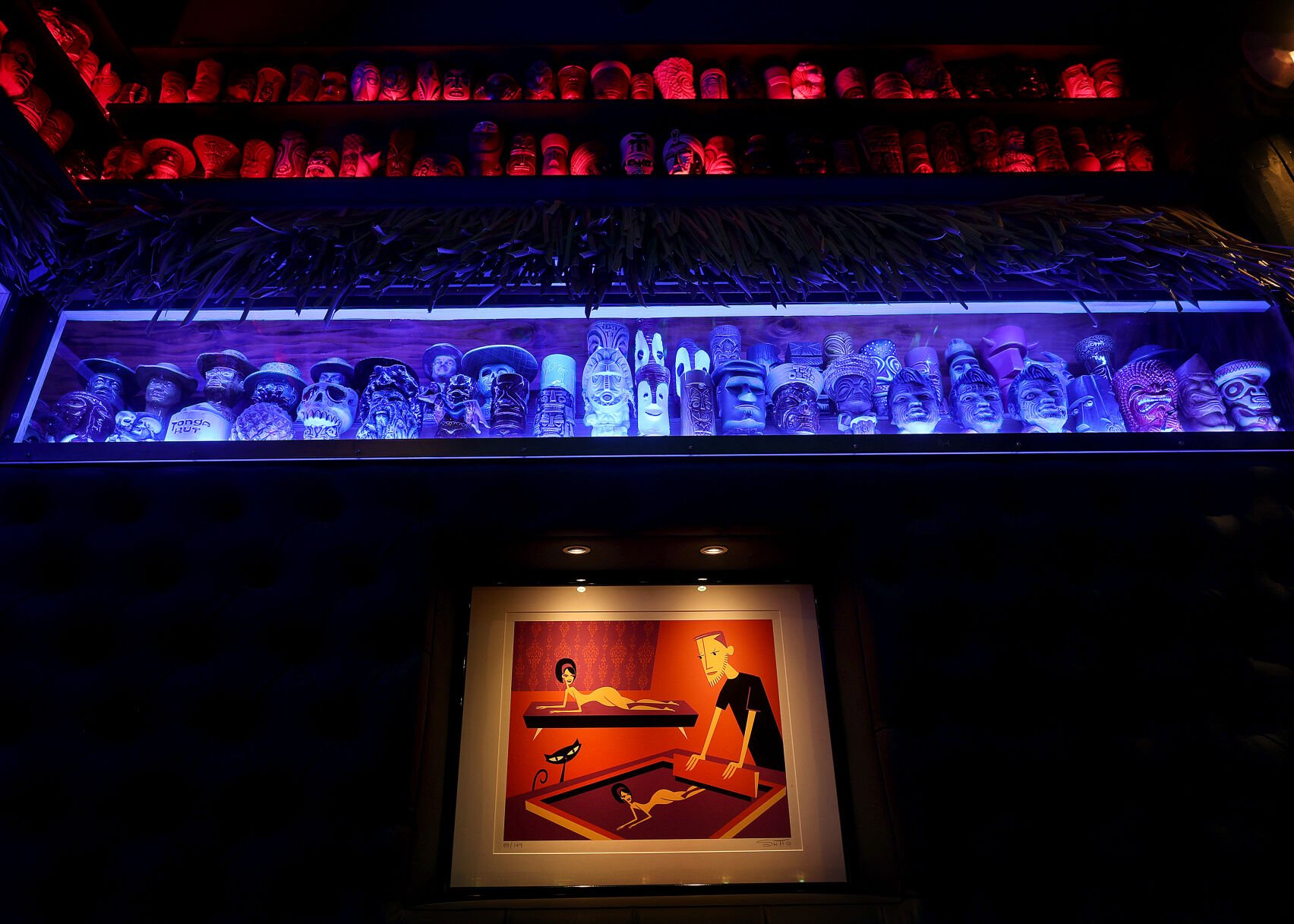
The design of the tiki bar Cabali showcases some of the 1,200 tiki mugs owned by Doug ‚ÄúFini‚ÄĚ Finical.
‚ÄúThey were all over his house, nicely organized. It wasn‚Äôt a mess, very intentional, but he had them in all these different rooms,‚ÄĚ the filmmaker recounted.
Finical said he initially was thinking Dragotta could do one of those stylized time-lapse films showing the bar being built from the ground up. They’d use it to promote Cabali on social media.
But Dragotta had a different plan after talking to Finical about his tiki collection and obsession.
‚ÄúAfter two days of interviews with him and just going about his house and seeing these mugs and the history of these mugs, I was like, ‚ÄėI think I have something really cool here‚Äô,‚ÄĚ he said.
‚ÄúI like that story about a guy that was here in Tucson, who was going to build this tiki bar dedicated to his mugs,‚ÄĚ Dragotta said. ‚ÄúHe wasn‚Äôt like a big tiki guy; he wasn‚Äôt like in this scene. He wasn‚Äôt part of this subculture, even though he was involved with it from the very beginnings of it.‚ÄĚ
It took Dragotta 3¬Ĺ years to bring the film to final cut and the attention of the Newport Film Festival.
‚ÄúHere we are showing the movie at Newport,‚ÄĚ he said. ‚ÄúIt‚Äôs been quite a ride.‚ÄĚ
Rich man’s hobby on working man’s budget
One of the final scenes in ‚ÄúCabali and the Tiki Obsession‚ÄĚ takes place at the bar‚Äôs February 2024 opening. It shows Finical opening the doors and a steady stream of people coming inside.
Finical said the line started forming at 6:30 that morning at the 500-pound bronze door that looks like an entrance; it’s not.
The entrance is around the back, along a wall covered in faux shrubs dotted with colorful Hawaiian-style plastic flowers. The building has no sign; it’s a speakeasy, a bar you know about only if you’re in the know.
Apparently, word had gotten out because that opening turned into a pretty steady business in spring and summer, the season Tucson restaurant and bar owners dread most.
‚ÄúIt was very steady and I was like, ‚ÄėI might actually land on my feet‚Äô, like I wasn‚Äôt going to be poor right away or have no income,‚ÄĚ Finical recalled one recent afternoon, sitting in Cabali‚Äôs aquarium nook, a small room with two ‚Äúportals‚ÄĚ displaying video loops of fish swimming in clear blue waters.

Doug ‚ÄúFini‚ÄĚ Finical built a tiki bar for his tiki mugs, which is the subject of Josh Dragatta‚Äôs documentary, coproduced by Finical, ‚ÄúCabali and the Tiki Mug Obsession.‚ÄĚ
Every detail of Cabali serves the art of tiki, from the hand-carved tiki poles and fabricated lava wall to the giant Tom Prevatt tiki towering above the bar and the custom chairs financed in part from Finical selling his truck. He also sold his home and moved into his late parents’ home to give himself leverage to borrow more money for the bar.
‚ÄúCabali is a modern Tiki Bar, as opposed to a lot of what I call musty, dusty tiki, which is the idea of found art ‚ÄĒ whatever washes up, you just sort of put it up wherever,‚ÄĚ Finical explained. ‚ÄúThere‚Äôs certainly a lot of eye candy, but it‚Äôs also a firmly organized space with a lot of places for your eyes to rest. ... Everything was built from scratch, which can get you into financial trouble really quick.
‚ÄúBuilding this kind of place and collecting tiki mugs and making movies are rich men‚Äôs hobbies and I wasn‚Äôt that.‚ÄĚ
‚ÄúWe have a long history of Fini spending all of our money,‚ÄĚ partner Mencke says in the film‚Äôs opening frames. ‚ÄúIt doesn‚Äôt take long when you start talking about building out a private party room for Fini to go, ‚ÄėWell, I‚Äôm gonna make it the world‚Äôs best tiki bar‚Äô.‚ÄĚ
Fini’s little promo film goes Hollywood
If he‚Äôs being honest, Finical isn‚Äôt entirely surprised that ‚ÄúCabali and the Tiki Mug Obsession‚ÄĚ made the cut for the Newport Film Festival.

Otto and Baby Do von Stroheim, the creators of ‚ÄúTiki News‚ÄĚ in 1995, are part of ‚ÄúCabali and the Tiki Mug Obsession.‚ÄĚ
‚ÄúThe demure thing to say would be like, ‚ÄėNo, I had no idea.‚Äô But I never had any doubts,‚ÄĚ he said, especially since documentaries, when they started working on the film in 2021, were a huge draw. ‚ÄúAnd the lighter the fair, the more latitude you can take in the telling of the story. We‚Äôre not talking about nuclear winter or racism; it‚Äôs Tiki mugs. This is glorified coffee mugs, right?‚ÄĚ
‚ÄúI think what we have is just a fun movie,‚ÄĚ added Dragotta. ‚ÄúIt really is just celebrating community and just watching a guy ... fulfilling his dream. This is something that he wanted to do, and as abstract as that may sound to some, you know, building a tiki bar? But ... he‚Äôs always wanted to do something that was more meaningful to him and personal, and so we follow that and you get a chance to see that happen.‚ÄĚ
Dragotta said he and Finical, who helped produce the film, would love to see it land in more festivals or perhaps get a distribution or streaming deal.
‚ÄúFor somebody to be able to sit in their house watching it on Netflix or Hulu and maybe get inspired by that, just to see a really good story and escape into this world of tiki and enjoy it and not be stressed out or conflicted in any way, that would make me happier than you can possibly imagine,‚ÄĚ he said.

